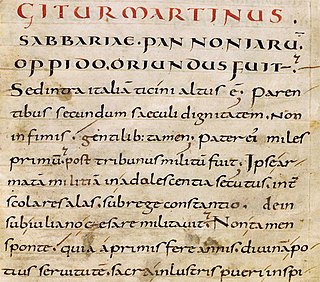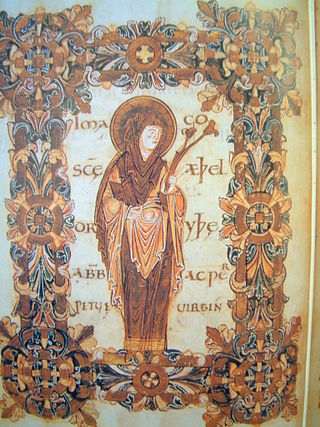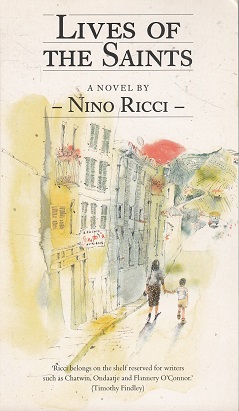Old English literature refers to poetry and prose written in Old English in early medieval England, from the 7th century to the decades after the Norman Conquest of 1066, a period often termed Anglo-Saxon England. The 7th-century work Cædmon's Hymn is often considered as the oldest surviving poem in English, as it appears in an 8th-century copy of Bede's text, the Ecclesiastical History of the English People. Poetry written in the mid 12th century represents some of the latest post-Norman examples of Old English. Adherence to the grammatical rules of Old English is largely inconsistent in 12th-century work, and by the 13th century the grammar and syntax of Old English had almost completely deteriorated, giving way to the much larger Middle English corpus of literature.

Swithun was an Anglo-Saxon bishop of Winchester and subsequently patron saint of Winchester Cathedral. His historical importance as bishop is overshadowed by his reputation for posthumous miracle-working. According to tradition, if it rains on Saint Swithun's bridge (Winchester) on his feast day it will continue for forty days.

A hagiography is a biography of a saint or an ecclesiastical leader, as well as, by extension, an adulatory and idealized biography of a preacher, priest, founder, saint, monk, nun or icon in any of the world's religions. Early Christian hagiographies might consist of a biography or vita, a description of the saint's deeds or miracles, an account of the saint's martyrdom, or be a combination of these.

Nino Pio Ricci is a Canadian novelist who lives in Toronto, Ontario. He was born in Leamington, Ontario to Italian immigrants, Virginio and Amelia Ricci, from the province of Isernia, Molise.

Æthelthryth was an East Anglian princess, a Fenland and Northumbrian queen and Abbess of Ely. She is an Anglo-Saxon saint, and is also known as Etheldreda or Audrey, especially in religious contexts. Her father was King Anna of East Anglia, and her siblings were Wendreda and Seaxburh of Ely, both of whom eventually retired from secular life and founded abbeys.

Dionysius the Areopagite was an Athenian judge at the Areopagus Court in Athens, who lived in the first century. A convert to Christianity, he is venerated as a saint by multiple denominations.
Ælfric of Eynsham was an English abbot and a student of Æthelwold of Winchester, and a consummate, prolific writer in Old English of hagiography, homilies, biblical commentaries, and other genres. He is also known variously as Ælfric the Grammarian, Ælfric of Cerne, and Ælfric the Homilist. In the view of Peter Hunter Blair, he was "a man comparable both in the quantity of his writings and in the quality of his mind even with Bede himself." According to Claudio Leonardi, he "represented the highest pinnacle of Benedictine reform and Anglo-Saxon literature".
West Saxon is the term applied to the two different dialects Early West Saxon and Late West Saxon with West Saxon being one of the four distinct regional dialects of Old English. The three others were Kentish, Mercian and Northumbrian. West Saxon was the language of the kingdom of Wessex, and was the basis for successive widely used literary forms of Old English: the Early West Saxon of Alfred the Great's time, and the Late West Saxon of the late 10th and 11th centuries. Due to the Saxons' establishment as a politically dominant force in the Old English period, the West Saxon dialects became the strongest dialects in Old English manuscript writing.
Ælfric Puttoc was Archbishop of York from 1023 to his death, and briefly Bishop of Worcester from 1040 to 1041. He may have crowned Harold Harefoot in 1036, and certainly assisted in that king's disinterment in 1040 and at the coronation of Edward the Confessor in 1043. He founded houses of canons and encouraged the cult of John of Beverley.
Wulfstan the Cantor, also known as Wulfstan of Winchester, was an Anglo-Saxon monk of the Old Minster, Winchester. He was also a writer, musician, composer and scribe. Wulfstan is most famous for his hagiographic work Vita S. Aethelwoldi.

Lives of the Saints is a novel by Nino Ricci. The author's first book, it forms the first part of a trilogy. The other two novels are In a Glass House and Where She Has Gone. Lives of the Saints was first published in 1990 and was the winner of the 1990 Governor General's Awards for fiction.
Ælfric of Abingdon was a late 10th-century Archbishop of Canterbury. He previously held the offices of abbot of St Albans Abbey and Bishop of Ramsbury, as well as likely being the abbot of Abingdon Abbey. After his election to Canterbury, he continued to hold the bishopric of Ramsbury along with the archbishopric of Canterbury until his death in 1005. Ælfric may have altered the composition of Canterbury's cathedral chapter by changing the clergy serving in the cathedral from secular clergy to monks. In his will he left a ship to King Æthelred II of England as well as more ships to other legatees.
Ælfric is an Anglo-Saxon given name.
Gone with the Wind most often refers to either:
The Aelfric Society was a text publication society founded in London, England, and active from 1842 to 1856, which published the Homilies of Ælfric of Eynsham and other works by Anglo-Saxon writers. It is also known as Aelfric Society Publications.
The sanctorale is one of the two main cycles that, running concurrently, comprise the Liturgical year in Roman Catholicism, defined by the General Roman Calendar, and used by a variety of Christian denominations.

The Lives of the Saints is a collection of short stories by Australian writer Edward Berridge published by University of Queensland Press (UQP) in 1995. Karen Brooks calls the book an example of grunge lit, an Australian literary genre from the 1990s.
Hugh Magennis is a scholar of Old English and the author of several books on Anglo-Saxon society and poetry, including especially Beowulf.






